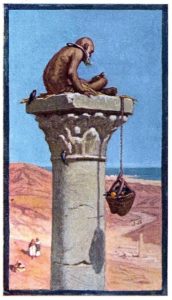The Old Testament is keen on the use of one consistent and accurate system of measurement. God was really quite wrath with those who used inaccurate or two systems of measurements. The Law of Moses stipulated (Deuteronomy 25:14 KJAV): Thou shalt not have in thine house divers measures, a great and a small. I hope this law was not speaking out prophetically against those of us who still have Centigrade and Fahrenheit thermometers in our homes, or, worse still, cookers and ovens marked up in both; or even tape measures that have both feet and inches, and what’s the other one? …centipedes and meteors? Could we make an allowance for such things because of the “hardness of our hearts”? Moses and others banged on about such hardness. A bit of hardness of heart allowance could let us off the hook maybe, and save us some money. After all, it could be quite expensive to rid ourselves of such abominations from our homes and especially our kitchens. Being part of Europe has introduced such duplicity at a deep level into all our lives. This has polluted England’s green and pleasant land which, we know with certainty, those feet in Ancient Times walked upon. (My English teacher told me never to end a sentence with a preposition. Sorry!) Such manifestations of this evil must be eradicated, root and branch! I ought to talk to that nice Mr. Barage. He’s got some well thought out ideas on this.
Deuteronomy 25:15 goes on to say: A perfect and just measure shalt thou have. (KJAV) This is a godly principle for daily life, and especially for statisticians, as we are about to face another General Distraction in June. In one version of the Bible – a modern paraphrase in really extremely contemporary language for the person on the street – the verse reads: A perfect and just measurement shalt thou have, and thou shalt in no wise, yea, in no manner cook the books (The Massage, Shed Publications LA, 2017).
Jesus too was keen on using one scale of measurement. In Matthew 7:1-2 (NRSV) he says: ...the measure you give will be the measure you get. He is talking about judging others; and if we must judge other people he is advocating a scale of measurement which we would be happy to apply to ourselves. Certainly, never try to physically measure people, however much you are tempted; and try to avoid doing it mentally as well, unless it is appropriate or necessary. Doing the former will, I guarantee (from 40 years experience in pastoral work) get you into big trouble. Doing the latter inaccurately also has potential for disaster, but not so immediate as the former. Jesus recommended avoiding judging whenever possible. If we must, we need to use not only a just scale, but one that is appropriate to what we are trying to measure.
In the film A Muppet Christmas Carol the last but one song in this inspired portrayal of Dickens’ story gives us one way of measuring the stature of a person. The song, Thankful Heart, offers us these words for us to ponder: “And, if you need to know the measure of a man, you simply count his friends.” This can be in part true. But beware! Some folks are very keen to establish their status or credential by naming their friends. This reminds me of the immortal lines from Round the Horn that were heard repeatedly in every episode: “Hello. My name’s Sandy and this is my friend Julian“. Sandy was obviously very concerned about establishing his status by identifying the fact that he had a particular friend. But the Muppet Movie song implies that the number of friends one has is an important factor in measuring a person’s stature.
 Assessed by this scale Simeon Stylites (390-459AD) (not to be confused with Simeon Stylites the Younger, Simeon Stylites III, or Symeon Stylites of Lesbos) would have scored zero, despite being canonised by the church. He was a Syrian ascetic who achieved notability for living 37 years on a small platform, one metre square, on top of a pillar near Aleppo. And he wasn’t on Facebook either, so any potential to increase the friend factor was severely hampered. Everything he needed went up 50 feet by bucket. And everything he didn’t need went down by bucket. Let’s hope it wasn’t the same bucket. But he spent 37 whole years, summers and winters, up there in prayer. He didn’t like distractions.
Assessed by this scale Simeon Stylites (390-459AD) (not to be confused with Simeon Stylites the Younger, Simeon Stylites III, or Symeon Stylites of Lesbos) would have scored zero, despite being canonised by the church. He was a Syrian ascetic who achieved notability for living 37 years on a small platform, one metre square, on top of a pillar near Aleppo. And he wasn’t on Facebook either, so any potential to increase the friend factor was severely hampered. Everything he needed went up 50 feet by bucket. And everything he didn’t need went down by bucket. Let’s hope it wasn’t the same bucket. But he spent 37 whole years, summers and winters, up there in prayer. He didn’t like distractions.
Mr. Gove was keen on measuring the education we provided for our children. He wanted most children to be above average. He worked with a scale of measurement that many teachers found it difficult to work with. (Oops! sorry another preposition. Perhaps this was the sort of thing that Mr. Gove was getting at – Oh dear, dear! There we go again.) One educationalist called him a moron. Perhaps it would have been better to say that his reasoning was like “the peace of God which passeth all understanding” (Philippians 4:7 KJAV)
Finally, in about 1968 Mr. Robert McNamara hit on another scale of measurement that has gone viral. In trying to measure American success in the Vietnam War he devised a scale which strangely enough was has been adopted by the business, professional and political world ever since. In 1972 Mr. Daniel Yankelovich summarised it in the following way:
The first step is to measure whatever can be easily measured. This is OK as far as it goes. The second step is to disregard that which can’t be easily measured or to give it an arbitrary quantitative value. This is artificial and misleading. The third step is to presume that what can’t be measured easily really isn’t important. This is blindness. The fourth step is to say that what can’t be easily measured really doesn’t exist. This is suicide.
(from “Corporate Priorities: A continuing study of the new demands on business”).
The McNamara Scale may rejoice the heart of the unbeliever. You can’t measure God so he doesn’t exist. We must remind such a person of this: we live in the time-space continuum; but don’t try measuring space or you might come to a depressing conclusion.

ADDENDUM:
Re the illustration above, one record says there was a bulaster around the 1 metre square platform on which Simeon Stylites spent 37 years. This probably kept him safe when he was asleep.
APOLOGY:
Re Mr. Gove, it would have been more courteous to say: “One educationalist used an unkind word beginning with ‘m’ to describe Mr. Gove. When using such language we must always be aware of what Jesus said in Matthew 5:22. We should never be in a hurry to say ‘Raca!’ or ‘Thou fool!’ “